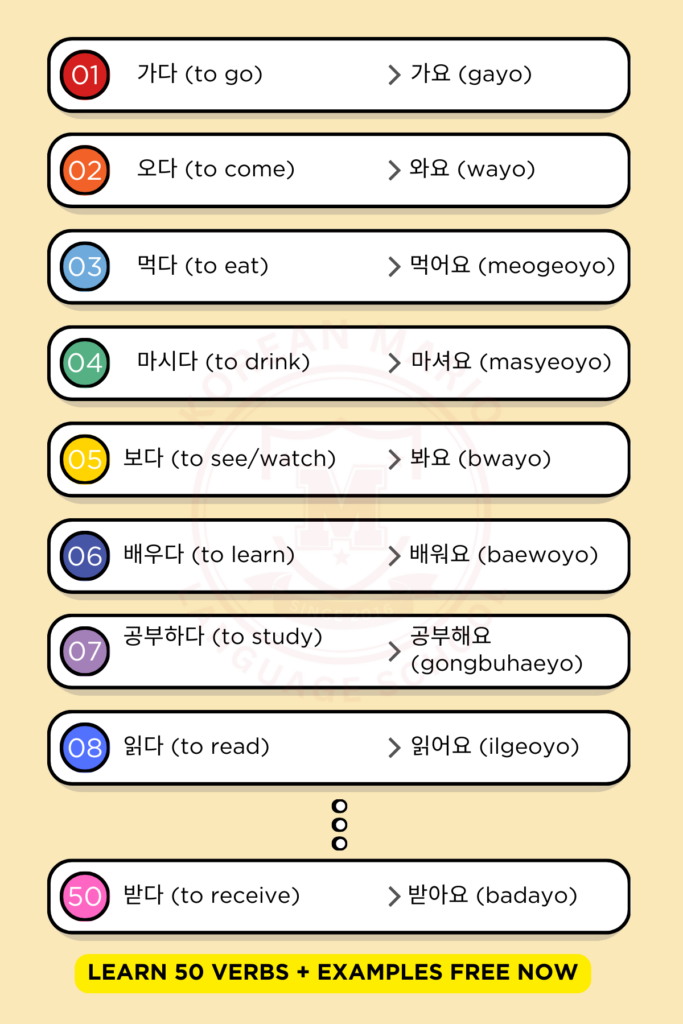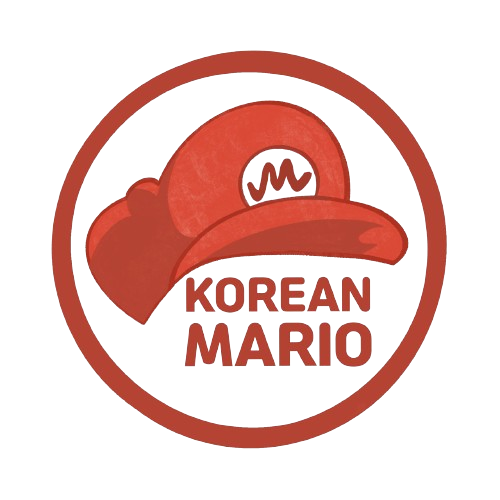
Hello everyone! Thank you for visiting my blog today. One of the most important aspects of learning Korean is mastering verbs. Verbs are the foundation of sentences and play a crucial role in expressing our thoughts and actions in various situations. In this post, I will introduce 50 commonly used Korean verbs, perfect for beginner and intermediate learners. Each verb is provided with romanization, making it easier to learn the pronunciation and meaning. Let’s dive into our study!
| 🔊 | 가다 (to go) – 가요 (gayo) 학교에 가요. (Hakgyoe gayo.) – I go to school. |
| 🔊 | 오다 (to come) – 와요 (wayo) 친구가 와요. (Chinguga wayo.) – A friend is coming. |
| 🔊 | 먹다 (to eat) – 먹어요 (meogeoyo) 밥을 먹어요. (Babeul meogeoyo.) – I eat rice. |
| 🔊 | 마시다 (to drink) – 마셔요 (masyeoyo) 물을 마셔요. (Mureul masyeoyo.) – I drink water. |
| 🔊 | 보다 (to see/watch) – 봐요 (bwayo) 영화를 봐요. (Yeonghwareul bwayo.) – I watch a movie. |
| 🔊 | 하다 (to do) – 해요 (haeyo) 숙제를 해요. (Sukjereul haeyo.) – I do homework. |
| 🔊 | 배우다 (to learn) – 배워요 (baewoyo) 한국어를 배워요. (Hangugeoreul baewoyo.) – I learn Korean. |
| 🔊 | 공부하다 (to study) – 공부해요 (gongbuhaeyo) 도서관에서 공부해요. (Doseogwaneseo gongbuhaeyo.) – I study at the library. |
| 🔊 | 읽다 (to read) – 읽어요 (ilgeoyo) 책을 읽어요. (Chaekeul ilgeoyo.) – I read a book. |
| 🔊 | 쓰다 (to write/use) – 써요 (sseoyo) 편지를 써요. (Pyeonjireul sseoyo.) – I write a letter. |
| 🔊 | 듣다 (to listen) – 들어요 (deureoyo) 음악을 들어요. (Eumageul deureoyo.) – I listen to music. |
| 🔊 | 만나다 (to meet) – 만나요 (mannayo) 친구를 만나요. (Chingureul mannayo.) – I meet a friend. |
| 🔊 | 사다 (to buy) – 사요 (sayo) 책을 사요. (Chaekul sayo.) – I buy a book. |
| 🔊 | 팔다 (to sell) – 팔아요 (parayo) 옷을 팔아요. (Oseul parayo.) – I sell clothes. |
| 🔊 | 자다 (to sleep) – 자요 (jayo) 잘 자요. (Jal jayo.) – Sleep well. |
| 🔊 | 일어나다 (to wake up) – 일어나요 (ireonayo) 일어나요. (Ireona yo.) – I wake up. |
| 🔊 | 일하다 (to work) – 일해요 (ilhaeyo) 회사에서 일해요. (Hoesaeseo ilhaeyo.) – I work at the company. |
| 🔊 | 필요하다 (to need) – 필요해요 (pillyohaeyo) 도움이 필요해요. (Doumi pillyohaeyo.) – I need help. |
| 🔊 | 쉬다 (to rest) – 쉬어요 (swieoyo) 쉬어요. (swieoyo.) – I take a rest. |
| 🔊 | 기다리다 (to wait) – 기다려요 (gidaryeoyo) 버스를 기다려요. (Beoseureul gidaryeoyo.) – I wait for the bus. |
| 🔊 | 좋아하다 (to like) – 좋아해요 (joahaeyo) 음악을 좋아해요. (Eumageul joahaeyo.) – I like music. |
| 🔊 | 싫어하다 (to dislike) – 싫어해요 (silheohaeyo) 고양이를 싫어해요. (Goyangireul silheohaeyo.) – I dislike cats. |
| 🔊 | 사랑하다 (to love) – 사랑해요 (saranghaeyo) 가족을 사랑해요. (Gajogeul saranghaeyo.) – I love my family. |
| 🔊 | 알다 (to know) – 알아요 (arayo) 그 사람을 알아요. (Geu sarameul arayo.) – I know that person. |
| 🔊 | 모르다 (to not know) – 몰라요 (mollayo) 그 문제를 몰라요. (Geu munjereul mollayo.) – I don’t know that problem. |
| 🔊 | 가르치다 (to teach) – 가르쳐요 (gareuchyeoyo) 학생들에게 가르쳐요. (Haksaengdeurege gareuchyeoyo.) – I teach students. |
| 🔊 | 운동하다 (to exercise) – 운동해요 (undonghaeyo) 매일 운동해요. (Maeil undonghaeyo.) – I exercise every day. |
| 🔊 | 청소하다 (to clean) – 청소해요 (cheongsohaeyo) 집을 청소해요. (Jibeul cheongsohaeyo.) – I clean the house. |
| 🔊 | 노래하다 (to sing) – 노래해요 (noraehaeyo) 노래를 해요. (Noraereul haeyo.) – I sing a song. |
| 🔊 | 요리하다 (to cook) – 요리해요 (yorihaeyo) 저는 요리해요. (Jeoneun yorihaeyo.) – I cook. |
| 🔊 | 이야기하다 (to talk) – 이야기해요 (iyagihaeyo) 친구와 이야기해요. (Chinguwa iyagihaeyo.) – I talk with a friend. |
| 🔊 | 전화하다 (to call) – 전화해요 (jeonhwahaeyo) 친구에게 전화해요. (Chinguege jeonhwahaeyo.) – I call a friend. |
| 🔊 | 말하다 (to speak) – 말해요 (malhaeyo) 한국어로 말해요. (Hangugeoro malhaeyo.) – I speak Korean. |
| 🔊 | 도와주다 (to help) – 도와줘요 (dowajwoyo) 저를 도와줘요. (Jeoreul dowajwoyo.) – Please help me. |
| 🔊 | 생각하다 (to think) – 생각해요 (saenggakhaeyo) 많이 생각해요. (Mani saenggakhaeyo.) – I think a lot.ow that problem. |
| 🔊 | 살다 (to live) – 살아요 (sarayo) 서울에 살아요. (Seoule sarayo.) – I live in Seoul. |
| 🔊 | 죽다 (to die) – 죽어요 (jukeoyo) 죽어요. (Jukeoyo.) – He/she dies. |
| 🔊 | 놀다 (to play) – 놀아요 (norayo) 친구와 놀아요. (Chinguwa norayo.) – I play with a friend. |
| 🔊 | 시작하다 (to start) – 시작해요 (sijakhaeyo) 수업을 시작해요. (Sueobeul sijakhaeyo.) – I start the class. |
| 🔊 | 끝나다 (to finish) – 끝나요 (kkeutnayo) 회의가 끝나요. (Hoega kkeutnayo.) – The meeting finishes. |
| 🔊 | 열다 (to open) – 열어요 (yeoreoyo) 문을 열어요. (Muneul yeoreoyo.) – I open the door. |
| 🔊 | 닫다 (to close) – 닫아요 (dadayo) 창문을 닫아요. (Changmuneul dadayo.) – I close the window. |
| 🔊 | 울다 (to cry) – 울어요 (ureoyo) 울어요. (Ureoyo.) – He/she cries. |
| 🔊 | 웃다 (to laugh) – 웃어요 (useoyo) 웃어요. (Useoyo.) – He/she laughs. |
| 🔊 | 춤추다 (to dance) – 춤춰요 (chumchwoyo) 춤을 춰요. (Chumeul chumchwoyo.) – I dance.that problem. |
| 🔊 | 여행하다 (to travel) – 여행해요 (yeohaenghaeyo) 여행을 해요. (Yeohaengeul haeyo.) – I travel. live in Seoul. |
| 🔊 | 준비하다 (to prepare) – 준비해요 (junbihaeyo) 시험 준비해요. (Siheom junbihaeyo.) – I prepare for the exam. |
| 🔊 | 쓰다 (to use/write) – 써요 (sseoyo) 컴퓨터를 써요. (Kompyuteoreul sseoyo.) – I use computer. |
| 🔊 | 받다 (to receive) – 받아요 (badayo) 선물을 받아요. (Seonmureul badayo.) – I receive a gift.class. |
| 🔊 | 들다 (to carry) – 들어요 (deureoyo) 가방을 들어요. (Gabangeul deureoyo.) – I carry a bag..) – The meeting finishes. |
The 50 verbs introduced today will greatly help you lay the foundation for your Korean learning journey. By familiarizing yourself with these frequently used verbs, you’ll be able to use Korean confidently in everyday conversations. Consistent practice and repetition are key, so be sure to use this post as a reference and incorporate these verbs into your daily life. I hope your Korean skills continue to improve day by day. I’ll be back with more useful content in the next post. Thank you!Korean’s Top 100 Verbs in Everyday Conversation
NEW BOOK: Korean’s Top 100 Verbs in Everyday Conversation
Take a moment to explore what our book has to offer, even if you haven’t made a purchase yet!




NEW BOOK: Korean’s Top 100 Verbs in Everyday Conversation
Learn essential Korean verbs and patterns with 1,000 examples and 500 vivid sentences, enhancing your proficiency in contemporary, everyday Korean conversation.
Our book features highlighted new vocabulary in every sample sentence, providing the most efficient way to study vocab, grammar, and phrases simultaneously.


